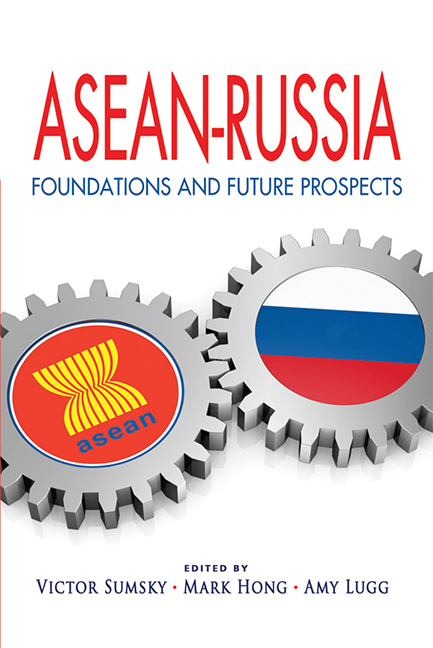Book contents
- Frontmatter
- Contents
- Foreword
- Preface
- About the Contributors
- Keynote Address
- Opening Remarks
- Keynote Address
- Introduction: Russia and the ASEAN Member States: Political and Economic Cooperation in Progress
- SECTION I WISEMEN'S VIEWS
- SECTION II GEOPOLITICS
- Russia in Southeast Asia: A New “Asian Moment”?
- ASEAN-Russia Military Ties: Reconfiguring Relations
- The Enlargement of the East Asia Summit: The Reasons and Implications of Bringing Russia In
- Russia's Entry into ASEM: Not Just a Courtesy Call?
- Russia-India-China: Acting in Concert in Southeast Asia?
- The South China Sea Issue: A View from Russia
- Southeast Asia and Russia: Forging a New Regional Architecture
- Russia-ASEAN Relations: An Indian Perspective
- SECTION III BILATERAL RELATIONS
- SECTION IV Business and Economics
- SECTION V CULTURE AND EDUCATION
- EPILOGUE
- Index
The South China Sea Issue: A View from Russia
from SECTION II - GEOPOLITICS
Published online by Cambridge University Press: 21 October 2015
- Frontmatter
- Contents
- Foreword
- Preface
- About the Contributors
- Keynote Address
- Opening Remarks
- Keynote Address
- Introduction: Russia and the ASEAN Member States: Political and Economic Cooperation in Progress
- SECTION I WISEMEN'S VIEWS
- SECTION II GEOPOLITICS
- Russia in Southeast Asia: A New “Asian Moment”?
- ASEAN-Russia Military Ties: Reconfiguring Relations
- The Enlargement of the East Asia Summit: The Reasons and Implications of Bringing Russia In
- Russia's Entry into ASEM: Not Just a Courtesy Call?
- Russia-India-China: Acting in Concert in Southeast Asia?
- The South China Sea Issue: A View from Russia
- Southeast Asia and Russia: Forging a New Regional Architecture
- Russia-ASEAN Relations: An Indian Perspective
- SECTION III BILATERAL RELATIONS
- SECTION IV Business and Economics
- SECTION V CULTURE AND EDUCATION
- EPILOGUE
- Index
Summary
The South China Sea issue continues to generate considerable interest within the world expert community. There is abundant evidence that it will exert an increasing influence on the evolving geopolitical order in Southeast Asia.
Attempts to mitigate the conflict potential of the multilateral territorial dispute in the South China Sea area have been quite numerous, varying in purpose, scale and character. The assessments of their results range from deeply pessimistic to cautiously optimistic, with some of the criticism generated, as it seems, by over-expectations. Under these circumstances, a re-evaluation of the efforts to solve the dispute and the results they are producing becomes a timely exercise.
So far, Moscow has not been known to display a keen interest in this issue. However, to pursue an effective policy in East Asia, it has to develop a more nuanced approach towards one of the region's key problems.
This paper offers a review of the recent trends and factors, both domestic and international which increase the importance of the South China Sea issue in the eyes of key East Asian players — the U.S., China and the Association of Southeast Asian nations (ASEAN). The course and nature of efforts aimed at lessening the conflict potential of the issue are analysed, with the emphasis on the themes which might be explored in order to strengthen the cooperative vector in relations between the parties involved. A brief outline of Russia's policy options towards the issue is given in the final passages.
The SOUTH CHINA SEA AS A PRIORITY OF EAST ASIAN POWERS
After the Declaration on the Conduct of Parties in the South China Sea (DOC) was signed in 2002, the situation in the area seemed to stabilize. However, later, new, thorny problems emerged. China and some claimants among the ASEAN countries reverted to more uncompromising positions simultaneously advancing their military capabilities, which hindered the observance of the DOC provisions. Later on, the issue came to the forefront of East Asian politics at the Hanoi session of the ASEAN Regional Forum (July 2010).
- Type
- Chapter
- Information
- ASEAN-RussiaFoundations and Future Prospects, pp. 97 - 109Publisher: ISEAS–Yusof Ishak InstitutePrint publication year: 2012



